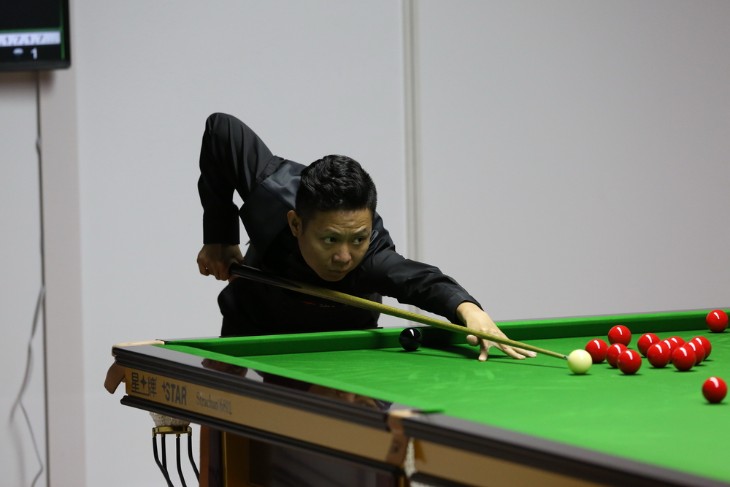- Snooker's British Roots and Its Traditional Impact
- Snooker in China: A Surge of New Interest and Talent
- Snooker's Influence in the Indian Subcontinent: A Blend of Heritage and Modernity
- The Evolution of Snooker in Europe: From Niche Interest to Mainstream Appeal
- Snooker in the Americas: A Growing Interest Amidst Dominant Sports Cultures
- Final Takeaway
Snooker, a cue sport known for its finesse and strategic depth, has transcended its British origins to become a global phenomenon. Its journey from the smoky snooker halls of the UK to the vibrant, diverse arenas across continents tells a story of cultural integration and impact.
In this article, we delve into the fascinating world of snooker and its varied cultural significance in different countries.
Snooker's British Roots and Its Traditional Impact
The Birthplace of Snooker: A British Legacy
Snooker started in Britain, and it's a big part of British culture. It began as a game for British Army officers in the 19th century. They played it in India and brought it back to the UK. In Britain, snooker quickly became popular.
In the early days, snooker was a game for the upper class. It was played in private clubs and gentlemen's halls. But soon, it spread to more people. Pubs and public halls started having snooker tables. This made the game available to everyone, not just the rich.
British snooker halls were more than places to play. They were where people from all walks of life met. They talked, shared stories, and enjoyed the game together. Snooker halls became social centres in many communities.
The game's rules were first set down in Britain. These rules helped make snooker a serious sport. They brought structure and fairness to the game. This was important for its growth.
Television played a big role in snooker's popularity in the UK. In the 1970s and 1980s, snooker matches were shown on TV. This brought the game to even more people. Famous players like Steve Davis and Jimmy White became stars. They helped make snooker a national pastime.
In the UK, snooker is more than just a sport. It's a part of history and culture. It represents skill, strategy, and sportsmanship. It's a game that brings people together, no matter who they are or where they come from.
Snooker's Role in British Society
Snooker holds a special place in British society. It's more than just a sport; it's a part of the country's social and cultural fabric. This game has touched the lives of many, from casual players to avid fans.
In the UK, snooker is known for bringing people together. It's played in pubs, clubs, and community centres. These places are not just for playing; they're where people meet and socialize. Snooker creates a sense of community. It doesn't matter where you come from or what you do; everyone can enjoy the game.
The sport has also been a source of national pride. British players have long dominated the world of snooker. Their success has brought attention and respect to the sport. It's common to see people gathered around TVs watching snooker, cheering for their favourite players.
Snooker's impact on British society goes beyond entertainment. It's a game that teaches patience, precision, and strategic thinking. These are skills that people value in everyday life. Playing snooker can be a way to relax, focus, and sharpen the mind.
For young people, snooker can be a positive activity. It keeps them engaged and teaches them about sportsmanship and fair play. Many community programs use snooker to reach out to youth, offering them a fun and constructive way to spend their time.
TV broadcasts of snooker have played a big role too. They've made the sport accessible to everyone. Big tournaments like the World Snooker Championship are watched by millions. These events bring the nation together, creating moments of shared excitement and joy.

Snooker in China: A Surge of New Interest and Talent
The Emergence of Snooker as a Popular Sport in China
Snooker has become a big sport in China. It started getting popular in the late 20th century. Now, it's one of the most liked cue sports in the country. This rise in popularity has been rapid and impressive.
One reason for snooker's popularity in China is the success of Chinese players. Ding Junhui, a top snooker player, has had a huge impact. His wins and skills have inspired many in China. People see him as a hero. He has shown that Chinese players can excel in this global sport.
The growth of snooker in China is also because of the government's support. They have promoted the sport as part of sports development. Many snooker academies and clubs have opened across the country. These places help train new players. They also make the game more accessible to everyone.
Televised snooker tournaments have helped too. They bring the excitement of snooker to many homes in China. People enjoy watching the skill and strategy of the game. These broadcasts have made snooker a popular topic of conversation and interest.
Snooker tournaments in China are big events now. They attract players from all over the world. These international tournaments have put China on the map in the world of snooker. They show China's growing role in global sports.
Young people in China are especially drawn to snooker. They see it as a cool and challenging sport. Schools and youth clubs often have snooker tables. This makes it easy for young people to start playing and enjoying the game.
Cultural Significance of Snooker in Modern China
In modern China, snooker is more than just a sport; it's a symbol of cultural change and prestige. The game's popularity reflects China's broader ambitions and modernization. It's a sign of the country's growing interest in diverse global sports.
Snooker in China is seen as a sport of intelligence and strategy. It's admired for the skill and thought it requires. This respect for the game ties in with traditional Chinese values that honour strategic thinking and mental sharpness. Snooker fits well with these cultural ideals.
The success of Chinese players in international snooker has boosted national pride. When Chinese players win overseas, it's a proud moment for the country. It shows the world that China excels in diverse fields, including sports. This success has encouraged more people, especially the youth, to take up the game.
Snooker also represents a modern, global China. It's a game that came from the West but has been embraced and excelled in by the East. This shows how China is engaging with and succeeding in global activities. It's a sign of China's openness to new ideas and global trends.
The game is also a popular social activity in China. People play snooker with friends and family. It's a way to relax, have fun, and bond. Snooker clubs and halls are common places for social gatherings. They are lively places where people of all ages come together.
Furthermore, snooker in China is linked to education and personal development. Parents see it as a good way for children to develop focus and strategic thinking. Schools and colleges often have snooker facilities. This shows how the game is seen as beneficial for mental and personal growth.
Snooker's Influence in the Indian Subcontinent: A Blend of Heritage and Modernity
Snooker's Historical Ties to India and Pakistan
Snooker has a special history in India and Pakistan. Its roots go back to the time of British colonial rule. The British army officers who played snooker in India introduced it to the region. Since then, it has grown to become a popular sport in both countries.
In the early days, snooker was a game for the elite. It was played in exclusive clubs and by people of high social standing. These clubs were often meeting places for important discussions and social gatherings. Snooker was a part of the lifestyle of the upper class in India and Pakistan.
Over time, snooker became more accessible. It spread beyond the elite circles. Clubs and snooker halls opened up to the general public. This made the game popular among people from all walks of life. Snooker halls became common in cities and towns, attracting a diverse crowd.
The game's growth in India and Pakistan is tied to its colonial history. But it has taken on a new life in these countries. It's no longer just a remnant of colonial times. Now, it's a part of the local culture and sports scene.
Snooker in India and Pakistan is also linked to local craftsmanship. The region is known for making high-quality snooker tables and cues. This craftsmanship is a source of pride. It shows the local connection and contribution to the sport.
The game has also produced notable players from the region. These players have competed in international tournaments. Their success has inspired many young people in India and Pakistan to take up snooker. It's a sign of the talent and passion for the game in these countries.
The Cultural Fabric of Snooker in South Asia
In South Asia, snooker is more than just a sport; it's a part of the region's cultural fabric. In countries like India and Pakistan, snooker blends tradition with modern entertainment, showing how the region embraces both its heritage and new influences.
Snooker halls in South Asia are bustling social hubs. They bring together people of all ages and backgrounds. These places are lively, filled with the sound of conversation and the clack of snooker balls. They are meeting points for friends, families, and even business associates.
The game is often seen as a symbol of skill and precision in South Asia. People admire the strategy and concentration needed to play snooker. It's common to see intense matches, where players and spectators are deeply engaged in the game. This respect for the skill involved in snooker ties in with South Asian values of mastery and dedication.
For many young people in South Asia, snooker is a way to connect with others and showcase their talent. It's a popular activity in colleges and youth clubs. Snooker competitions at local and national levels are events that draw in crowds and foster community spirit.
Snooker also reflects the diverse cultural landscape of South Asia. It's played in traditional clubs that have been around for decades, as well as in modern cafes and gaming zones. This mix shows how snooker has adapted to different settings and times in South Asian society.
The game is a part of festive occasions too. During festivals and celebrations, snooker tournaments are often organized. These events are full of excitement and friendly rivalry. They add to the festive atmosphere and bring joy to communities.
The Evolution of Snooker in Europe: From Niche Interest to Mainstream Appeal
Snooker's Growth Beyond the UK in European Countries
Snooker has grown a lot in European countries, moving beyond its UK roots. In places like Germany, Belgium, and the Netherlands, the game has gained a significant following. This growth shows how snooker has appealed to people across Europe.
In these European countries, snooker was once a lesser-known sport. But now, more people are playing and watching it. Snooker clubs have opened in many cities, attracting new players. These clubs are places where people come to learn the game and improve their skills.
The popularity of snooker in Europe is also seen in the rise of tournaments. Local and national competitions are common. These events draw in players of all levels. They are great for showing the skill and excitement of the game. Some European players have started competing in international tournaments too.
Television has helped snooker's growth in Europe. Matches and tournaments are often shown on TV. This has made the sport more visible and accessible. People who might not have known about snooker are now getting interested in it.
In these European countries, snooker is seen as a game of strategy and precision. It appeals to those who like sports that require careful thinking and skill. This view of the game fits well with the European appreciation for tactical and mental sports.
Snooker's growth in Europe also reflects cultural openness. It shows how European societies are open to new and diverse sports. Snooker brings a different kind of sporting experience, and people in Europe have welcomed it.
Cultural Relevance of Snooker in Europe
In Europe, snooker is more than a sport; it's a symbol of mental agility and precision. Its growth in countries like Germany, Belgium, and the Netherlands reflects a cultural appreciation for sports that challenge the mind as well as the body.
European fans see snooker as a game of strategy. It's not just about hitting balls; it's about thinking several steps ahead. This aspect of the game resonates with the European value of tactical planning and intellectual engagement. People enjoy watching the players plot their moves and execute them with skill.
Snooker also represents a quiet, focused competition, different from many high-energy sports. In a fast-paced world, snooker offers a slower, more thoughtful form of entertainment. This appeals to European audiences who appreciate sports that require patience and careful concentration.
The game has become a part of social life in many European countries. Snooker clubs are not just places to play; they're spots where people meet and relax. They offer a cosy, friendly environment where fans and players share their love for the game.
In Europe, snooker also symbolizes inclusivity in sports. It's a game that people of all ages and abilities can enjoy. It doesn't require the physical strength of some other sports, making it accessible to a wider audience. This inclusivity aligns with the European ethos of embracing diverse activities.
The rise of snooker in Europe has also led to more cultural exchanges. European players participate in international tournaments, and top players from around the world come to Europe for events. These exchanges enrich the cultural and sporting landscape of the continent.

Snooker in the Americas: A Growing Interest Amidst Dominant Sports Cultures
Snooker's Position in North and South America
In North and South America, snooker holds a unique position. It's not as well-known as sports like basketball or football, but it has a growing presence. In countries like Canada and Brazil, more people are getting interested in snooker.
Snooker in these regions is often seen as an alternative sport. It offers something different from the mainstream sports. People who are looking for a new kind of challenge find snooker intriguing. Its blend of mental strategy and physical skill attracts those who enjoy complex and nuanced games.
The sport's growth in the Americas can be seen in the increasing number of snooker clubs and enthusiasts. These clubs are becoming popular spots for people to learn and play. They provide a space where fans of the game can meet and share their interest.
Television coverage of international snooker tournaments has also sparked interest. When people watch these tournaments, they see the skill and strategy involved. This exposure has helped raise snooker's profile in the Americas.
In some parts of North and South America, snooker is also seen as a social activity. It's a game that people play with friends and family for fun. Snooker tables are found in bars and recreational centres, making the game accessible to a casual audience.
The sport's appeal in these regions is also due to its inclusive nature. Snooker doesn't require high physical strength or speed, making it accessible to a wide range of people. This inclusivity is a big part of its charm.
Cultural Perspective of Snooker in American Societies
In American societies, snooker is viewed as a distinctive and intriguing sport. It's different from the more dominant sports like basketball or soccer. This difference gives snooker a unique place in the cultural landscape of both North and South America.
Snooker in these regions is often seen as a game of skill and precision. People admire the level of concentration and strategy required. This appreciation aligns with a cultural interest in activities that challenge both the mind and body. Snooker offers a different kind of sporting experience, one that's less about physical strength and more about mental agility.
The game is also recognized as a social activity in American societies. In places like Canada and Brazil, snooker is a way for people to come together. Friends meet over a game of snooker in bars or clubs. It's a leisure activity that fosters social interaction and camaraderie.
In addition, snooker in the Americas is viewed as an inclusive sport. It's accessible to people of all ages and abilities. This inclusivity is important in societies that value diverse and accessible sports. Snooker offers a welcoming environment for anyone interested in trying a new sport.
The cultural perspective of snooker in America also includes its role in promoting focus and discipline. The game requires players to be patient and thoughtful. These qualities are respected in American cultures, which often emphasize the value of focus and strategic thinking in various aspects of life.
Furthermore, snooker's growing popularity in these regions reflects a broader cultural trend towards embracing global sports. As societies in North and South America become more interconnected with the rest of the world, sports like snooker gain more attention and appreciation.
Final Takeaway
Snooker's journey across continents has seen it adopt various cultural significances. From its traditional British roots to its prestigious status in China, its historical relevance in the Indian subcontinent, its tactical appreciation in Europe, and its growing interest in the Americas, snooker is a sport that transcends borders and unites diverse cultures. It's not just a game of cues and balls; it's a reflection of the cultural complexities and global interconnectedness of our modern world.
For more information:




.webp)


 (1).webp)




















